
Excertos do catálogo

Implants trauma Proximal Humeral Locking Plate
Abrir o catálogo na página 1
CAUTION: Federal Law (USA) restricts this device to sale by or on the order of a board certified physician. WARNING: If there is no sufficient bone healing, wrong or incomplete postoperative care, plate might break. All ITS plates are preformed anatomically as a matter of principle. If adjustment of the plate to the shape of the bone is required, this is possible by carefully bending gently in one direction once. Particular care is required when bending in the region of a plate hole, as deformation of the plate may lead to a failure of the locking mechanism. The plate must not be buckled or...
Abrir o catálogo na página 2
1. Introduction P. 5 Preface P. 6 Screws P. 7 Properties P. 8 Indications & Contraindications P. 8 Time of operation 2. Surgical Technique P. 10 Assembling of the percutaneous guide P. 10 Pre-operative patient preparation P. 11 Exposure P. 11 Reduction P. 12 Plate insertion P. 13 Intraoperative identification of screw length P. 14 Placement of the screws P. 18 Disassembling of the percutaneous guide P. 19 Optional fixation of soft tissue P. 19 Optional fixation in the shaft area with cerclage P. 19 Postoperative treatment P. 19 Explantation 3. Information P. 21 Locking P. 21 Dotize® P. 22...
Abrir o catálogo na página 3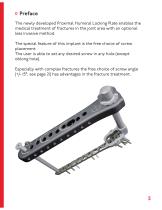
Preface The newly developed Proximal Humeral Locking Plate enables the medical treatment of fractures in the joint area with an optional less invasive method. The special feature of this implant is the free choice of screw placement. The user is able to set any desired screw in any hole (except oblong hole). Especially with complex fractures the free choice of screw angle (+/- 15°, see page 21) has advantages in the fracture treatment.
Abrir o catálogo na página 5
Cortical Screw, locking, D=3.5mm, SH Spiral Drill, D=2.7mm, L=220mm, AO Connector Spiral Drill, D=2.7mm, L=220mm, AO Connector Cancellous Screw, locking, D=4.2mm, SH Spiral Drill, D=2.5mm, L=220mm, AO Connector Guide Wire, Steel, D=1.6mm, L=260mm, TR, w. thread
Abrir o catálogo na página 6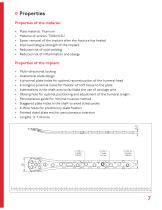
Properties Properties of the material: • • • • • • Plate material: Titanium Material of screws: TiAl6V4 ELI Easier removal of the implant after the fracture has healed Improved fatigue strength of the implant Reduced risk of cold welding Reduced risk of inflammation and allergy Properties of the implant: Multi-directional locking Anatomical plate design 6 proximal plate holes for optimal reconstruction of the humeral head 6 marginal proximal holes for fixation of soft tissue to the plate Indentations in the shaft area to facilitate the use of cerclage wire Oblong hole for optimal...
Abrir o catálogo na página 7
Indications, Contraindications & Time of operation Indications: • All stable and unstable fractures with or without shaft involvement Severe osteoporosis Existing infections in the area of the fracture In cases of skin and soft tissue problems Obesity Lack of patient compliance Time of operation: • Primary as well as secondary after swelling subsides and after temporary fixation
Abrir o catálogo na página 8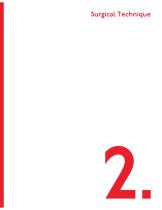
Surgical Technique
Abrir o catálogo na página 9
Assembling of the percutaneous guide 1 Pre-operative patient preparation • Positioning on a radiolucent surgical table • Semi-sitting angle of about 30° - 40°, shoulder should be freely moveable (optional shoulder table) • The arm should be freely moveable to allow fracture reduction • General anaesthesia, regional anaesthesia or combination can be used
Abrir o catálogo na página 10
Exposure Anterolateral access: • Skin incision parallel to the anterior acromion and extension 5cm distally in fiber direction of the M. deltoideus. • Detachment of the pars acromialis of the M. deltoideus. Reduction Anatomical reduction of the fracture under fluoroscopy.
Abrir o catálogo na página 11
Plate insertion • • • • Insert the plate, assembled on the percutaneous guide (recommended in Z position) Plate remains in constant contact with the bone and slide distally Align the proximal end of the plate on the Tuberculum majus Verify the correct plate position. Optional temporary fixation with guide wires, steel, D=1.6mm, L=260mm, TR, w. thread (35164-260) into proximal guide wire holes.
Abrir o catálogo na página 12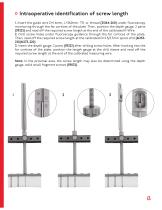
Intraoperative identification of screw length 1. Insert the guide wire D=1.6mm, L=260mm, TR, w. thread (35164-260) under fluoroscopy monitoring through the far cortices of the plate. Then, position the depth gauge, 2 parts (59222) and read off the required screw length at the end of the calibrated K-Wire. 2. Drill screw holes under fluoroscopy guidance through the far cortices of the plate. Then, read off the required screw length at the calibrated D=2.5/2.7mm spiral drill (61253220/61273-220). 3. Insert the depth gauge, 2 parts (59222) after drilling screw holes. After hooking into the far...
Abrir o catálogo na página 13
Placement of the screws Fix the plate temporarily to the bone and drill with the spiral drill, D=2.7mm, L=220mm, AO Connector (61273-220) in the oblong hole. Drilling is performed through the D=2.8mm drill sleeve (118005-10) that was placed in the tissue protection sleeve (118005-8). Then, the drill sleeve is removed and a D=3.5mm cortical screw (32351-XX) (appropriate length measured before) is inserted through the tissue protection sleeve. Advice: For optimal positioning and adjustment of the humeral length, we recommend to first fill the oblong hole. Therefore there is a centric and...
Abrir o catálogo na página 14
Unscrew the clamping nut (118005-4) up to the black mark (see picture below), rotate the handle 180° and tighten the clamping nut by hand. Then using the spiral drill, D=2.5/2.7mm, L=220mm, AO Connector (61253-220/61273-220) to drill through the drill guide, D=2.7/2.0mm (62202) into a proximal hole. Use the screwdriver, WS 2.5 (56252-150) to insert a D=3.5mm locking cortical screw (37351XX-N) or a D=4.2mm locking cancellous screw (37422-XX-N) of appropriate length determined previously with the depth gauge, solid small fragment screws (59022).
Abrir o catálogo na página 15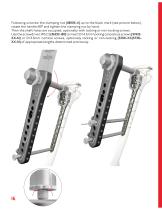
Following unscrew the clamping nut (118005-4) up to the black mark (see picture below), rotate the handle 180° and tighten the clamping nut by hand. Then the shaft holes are occupied, optionally with locking or non-locking screws. Use the screwdriver, WS 2.5 (56252-150) to insert D=4.2mm locking cancellous screws (37422XX-N) or D=3.5mm cortical screws, optionally locking or non-locking (32351-XX/37351XX-N) of appropriate lengths determined previously.
Abrir o catálogo na página 16Todos os catálogos e folhetos técnicos I.T.S.
-
ufs
1 Páginas
-
DHL
2 Páginas
-
ITS
2 Páginas
-
DHL - Distal Humeral Locking Plates
20 Páginas
-
PHL
24 Páginas
-
ACLS
20 Páginas
-
CFN
32 Páginas
-
OLS
24 Páginas
-
PHLs
20 Páginas
-
CTN - Cannulated Tibia Nail
28 Páginas
-
UOL - Ulna Osteotomy Locking Plate
32 Páginas
-
SR Sacral Rods
20 Páginas
-
HCS
24 Páginas
-
TOS Twist-Off Screw
20 Páginas
-
TLS
20 Páginas
-
PRS-RX
32 Páginas
-
HLS
20 Páginas
-
PLS - Pilon Locking Plates System
24 Páginas
-
ES
20 Páginas
-
SR
20 Páginas
-
FL
24 Páginas
-
PL - Pilon Locking Plate small
12 Páginas
-
PRS - Pelvic Reconstruction System
28 Páginas
-
PRL - PROlock Radius Locking Plate
20 Páginas
-
OHL - Olecranon Hook Locking Plate
24 Páginas
-
OL - Olecranon Locking Plate
24 Páginas
-
CAS
40 Páginas
-
FCN
20 Páginas
-
HOL
24 Páginas
-
FLS
24 Páginas
-
PFL
20 Páginas
-
DTL
24 Páginas
-
HTO
24 Páginas
-
PTL
32 Páginas
-
DFL
32 Páginas
-
SCL
32 Páginas
-
SLS
24 Páginas
-
CAL
20 Páginas
-
DUL
24 Páginas
-
CLS
28 Páginas









































































